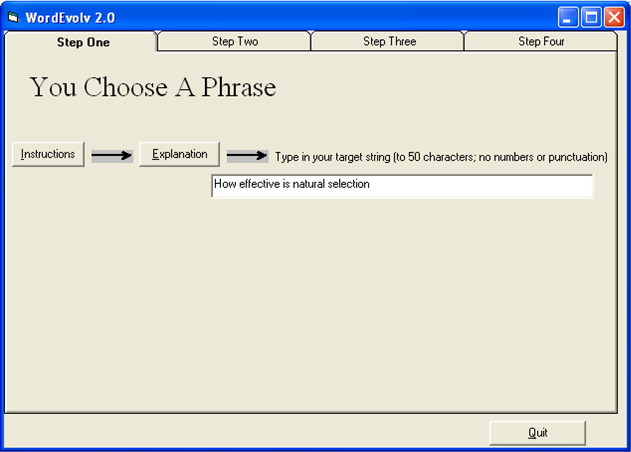James Madison University - Department of Geology & Environmental Science
Teaching Chaos and Complex Evolutionary Systems Theories at the Introductory Level
Model: WordEvolv
Elaborating Evolution: The General Evolutionary AlgorithmStrategies and Rubrics for Teaching Chaos and Complex Systems Theories as Elaborating, Self-Organizing, and Fractionating Evolutionary Systems,
Fichter, Lynn S., Pyle, E.J., and Whitmeyer, S.J., 2010, Journal of Geoscience Education (in press)Description: WordEvolv is a simple, powerful, and very effective demonstration of how efficiently a mutation/natural selection strategy can evolve a meaningful pattern from a meaningless string of random letters. This is also a non-biological demonstration of the General Evolutionary Algorithm: (1) elaborate, (2) select, (3) amplify (4) repeat. WordEvolv is a good example of a non-biological elaborating evolutionary system since we are not working with direct biological analogs.
Presentation: Here is a copy of the WordEvolv program. Usually this is a class demonstration, but depending on the class we may have them run some experiments themselves in the lab. We begin by establishing a target string; a phrase, or someone’s name. This becomes the fitness function. Next the program calculates how long it would take to generate the target string if we were doing it completely at random. For the target string, “What is this phrase” there are 2.43 x 10E18 possible strings, which on my computer would take 88,185 years to generate. However, beginning with a random string the same length as the target string, and running it through a mutation and selection process (three different strategies are available in the program) the target string can be evolved in generally between 50 and 75 generations (depending on the random starting string). A “view text file” allows everyone to see the evolutionary steps from the initial random string to the final string.
Anticipated Learning Outcome:
- 15. The general evolutionary algorithm—1) differentiate, 2) select, 3) amplify, 4) repeat—is an extremely efficient and effective method of natural selection.
WordEvolv
- a non-biological example of an elaborating evolutionary system.Lab Experiments
- lab experiments that also describes how the model works.
 Lynn S. Fichter
Lynn S. Fichter
 Steve Baedke
Steve Baedke
 Eric Pyle
Eric Pyle
 Steve Whitmeyer
Steve Whitmeyer